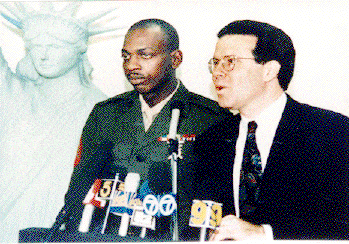- H-1B Cap: Increases cap to 195,000 for FY2001, 2002, and 2003
- Backlog Clearout: The bill mandates that all H-1B cases approved in 1999 after the cap was reached and before October 1, 1999 are counted against the FY1999 cap, and all cases filed before September 1, 2000 are to be counted against the FY2000 cap, regardless of when they are approved. The caps for those years are raised to accommodate however many visas this would require.
- Exemption from the Cap: Exempts individuals employed at higher educational institutions and their related or affiliated nonprofit entities, and individuals employed by nonprofit research organizations or governmental research organizations from being counted toward the H-1B cap. (Exemption from the cap for foreign graduates of U.S. masters or Ph.D. programs is deleted). Also, H-1B physicians who have received a J-1 Conrad 20 waiver of the two-year home residency requirement are exempt from the cap. Anyone exempt from the cap by virtue of their employment with one of the entities described above who subsequently changes employers to one that is not described would be counted toward the cap in the year they change employers.
- H-1B Count: Prohibits the INS from counting someone toward the H-1B cap if they have had H-1B status in the previous 6 years, unless the individual would be authorized for a new six-year period of stay at the time the petition is filed.
- Per Country Limits: Will allow unused employment-based immigrant visas in a calendar quarter to be allocated in subsequent quarters without regard to per-country limits. Allows an individual who has an I-140 filed on his or her behalf and who would be subject to per-country limits to extend his or her nonimmigrant status until the adjustment of status application is decided.
- Portability of H-1B Status: H-1B nonimmigrants may change jobs upon the filing of a new petition by the new employer as long as the individual is in lawful status at the time of filing and has not engaged in any unauthorized employment since his or her last lawful admission.
- Portability of I-140s and Labor Certs: Allows individuals who have filed for adjustment of status and whose cases have been pending for 180 days or more to change jobs or employers without affecting the validity of the I-140 or underlying labor certification, as long as the new job is in “the same or a similar occupational classification” to the job in the original petition and labor cert.
- Recapture of Unused Employment-based Immigrant Visas: Provides that any employment-based immigrant visas that were available but unused in FY1999 and FY2000 are to be “banked” for use in future fiscal years if the demand for employment-based visas exceeds the overall cap for that year. (This shall take place in addition to any “spill up” of unused visas to the family preferences that would otherwise occur.)
- Sixth-Year Extension for H-1Bs Awaiting Green Cards: Provides that H-1B nonimmigrants for whom an I-140 has been filed and whose labor cert or I-140 was filed at least 365 days prior, may obtain extensions of their H-1B status beyond the six-year maximum, in one-year increments, until their adjustment of status or immigrant visa application is decided.
- Extension of Attestations and DOL Investigative Authorities Through 2003: Extends the additional attestations and DOL investigative authorities from ACWIA through FY2003
- Recovery of Fraudulent Visas: Provides that for any H-1B petition revoked for fraud or willful misrepresentation, the visa number shall be added back to the cap in the year the petition is revoked, regardless of when the visa was actually issued.
- Additional Funds to INS for Processing: Increases INS’ portion of the H-1B education and training fee to 4% from the current 1.5%
- Education and Training Provisions: Worked out in a compromise between Senators Abraham, Kennedy, Lieberman and others.
- 55% of the H-1B education and training fees are to go toward DOL demonstration programs and projects to provide technical skills training for workers. Training shall not necessarily be at the level of a baccalaureate degree, but preparation for workers at a broad range along the career ladder. 75% of the grants shall be to workforce investment boards or consortia of such boards in a region, to be decided in consultation with the Dept. of Commerce. 25% of the grants will go to partnerships of at least 2 businesses or a business-related nonprofit organization that represents more than one business, and may include any educational, labor, community organization or workforce investment board. 80% of grants will be for skills training in high technology, information technology, and biotechnology and no more than 20% to training workers for skills in other H-1B-type specialty occupations.
- 22% of the fees will go toward low-income scholarships instituted in ACWIA (“Abraham scholarships”)
- 15% of the Fees will go toward NSF competitive grants for K-12 math, technology and science education.
- 4% of Fees go to the Department of Justice and the INS for H-1B case processing and enforcement of those attestations under their jurisdiction.
- 4% of fees go to the Department of Labor for enforcement and processing of LCAs.
- Studies and Reports: Requires a new NSF study on the divergence of access to high technology (“digital divide”), Dept. of Commerce to conduct a review of existing public and private high-tech workforce training programs in the United States (Kerry amendment).
- Kids 2000: Biden amendment from committee that provides after-school technology grants to the Boys and Girls Clubs of America. Up to $20 million may be appropriated for FY2001-2006 to the Attorney General to fund grants under this program, such funds may come from the Violent Crime Control Trust Fund.
- Backlog Reduction Provisions: The bill incorporates the text of the Immigration Services and Infrastructure Improvement Act (S. 2586, introduced by Senator Feinstein), which provides for the creation of a new Immigration Services and Infrastructure Improvement Account (and authorizes appropriations to fund this account) in order to reduce INS processing time of all cases to less than 180 days and eliminate the backlog of pending cases. The bill requires INS to provide a backlog elimination plan to Congress within 90 days of the enactment of the bill, and annual reports on their service provision situation and progress toward improvement.
Courtesy of the American Immigration Lawyers Association
Client Reviews

Know Their Job Well And Perform It Flawlessly
“Don't do the mistake we did and try to save few bucks going with nonprofessionals and sole practitioners! It will end up not only costing you much more in the long run, but also putting your status in jeopardy which can have a priceless impact. It is one of the most important steps in your life.”
- Sgt. Danny Lightfoot, Los Angeles, California
Read More Reviews
Zoom Consultations Available!








